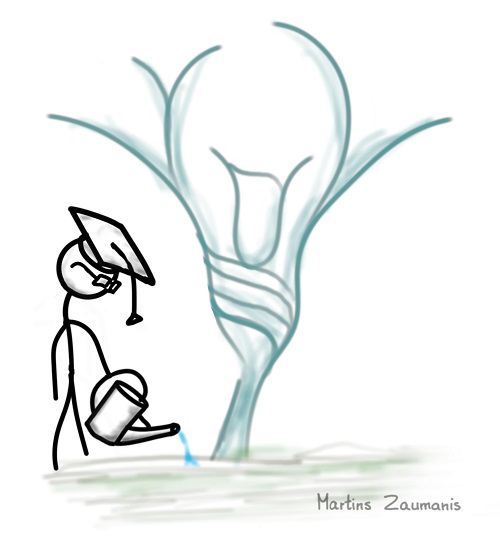
Coming up with a research project idea for a research proposal that has a good chance of getting grant funding is no small feat. In my experience, it is not possible to write more than a couple of good research grant proposals per year. You either run out of time due to other obligations, or you run out of stamina since writing research proposals takes a lot of mental energy.
This makes it even more important to carefully select the best research project idea to put your time and energy into.
In this article, I will show you how to first come up with many research ideas, then refine them to select the best one for writing a full research proposal.
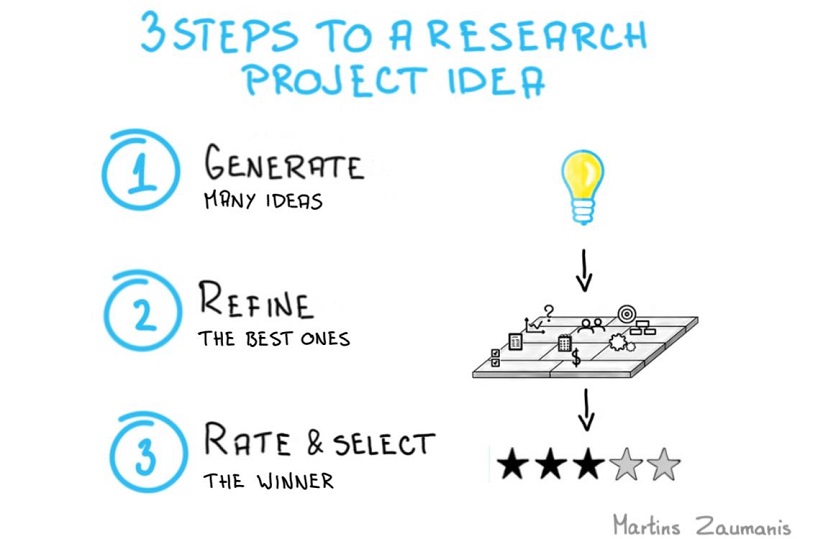
Three steps to generate worthy research project ideas:
- Generate an abundance of research project ideas
- Refine the promising ideas using the Research Project Canvas
- Rate your research project ideas and select the winner
It’s not only going to be only theory. I will equip you with the Research Idea Generation Toolkit that holds one worksheet for each of the three steps. You can download the toolkit here, but I suggest you first read the article to see how to use it.
Step 1: Generate an abundance of Research Project Ideas
Below I have summarized prompts that should help you come up with many new research project ideas. When answering the prompts, be bold and write down everything that comes into your mind. Don’t prejudge yourself and feel free to write even the craziest research ideas. The objective of this brainstorming is not instant perfection. Rather, you are trying to generate an abundance of project ideas that you can refine and judge in steps 2 and 3 of the ideation process.
I have placed the questions in ten categories. You will see later on how these categories will allow you to screen the ideas to select the best one. By “the best one” I mean a research idea that is doable, has the potential for a significant scientific value, and has the highest chance for being funded.

What scientific problem needs to be solved?
What are some knowledge gaps which authors have identified in their research papers/books?
What issues are being discussed at industry conferences?
What obstacles am I facing during my own research?
What observations are lacking theoretical background?
What research problems have my colleagues identified? (ask them)
What problems are stakeholders facing? (ask them)

Objectives
What research products need to be developed?
What are the smaller steps that will help to solve a larger problem?
What are some of the newer research trends in my field?

Methodology
What research methodology have I developed and could expand?
What research methodology needs improvement?
What previous research project could I build on?
What scientific hypothesis needs to be proven?

Resources
What could I accomplish by borrowing research methods, technology, materials, or equipment from other fields?
What could I do with the unique equipment I have?
What could I do with the special materials I have?
How could I make further use of my existing data?

Participants
What am I good at/known for?
What research topics excite me?
What unique skill-set do I possess?
What problem could my partners help me solve?
What intriguing problems do I want to solve during my career?

Results and Impact
What results are needed to solve a certain problem?
What information is missing in my field?
What needs to change?
What could I do to make a real impact?

Dissemination
What research results need to be shared?
What intellectual property needs to be protected?
How can I improve the communication of my scientific results?
What or who could help me to share my research results?

Timeline
What needs to be urgently solved?
In what sequence should the identified research gap be filled?
What can I manage to solve before I need to finish (e.g. moving to another institution or a research grant running out)?
What are my competitors rushing to solve?

Budget
What topics are being requested in research call proposals?
What problems are industry partners asking me to solve?
What research is someone willing to pay me for?

Funder’s requirements
What topics are being requested in research call proposals?
What problems are industry partners asking me to solve?
What research is someone willing to pay me for?
I have summarized these idea generation prompts in a Research Idea Generation Worksheet. Use the worksheet to collect all your project ideas in one place. Make sure to write the date on the worksheet and save it so that you can review your ideas whenever you have to come up with a new research project proposal.
You can download the Research Project Idea Generation Worksheet together with the other tools in the Research Idea Generation Toolkit.
Step 2: Sort Through the Research Project Ideas using the Research Project Canvas
Once you have generated many ideas using the Research Project Idea Generation Worksheet, you have to sort through them to select the winner. You can probably drop the project ideas that you definitely don’t want to pursue quite easily. However, to select THE ONE project idea that you want to invest your time and effort in, you have to consider many factors:
- the potential of the research idea to make a meaningful contribution in scientific knowledge
- your interest and expertise in working on the topic
- the chances of obtaining research project funding
- the resources you have available for successfully executing the research project
- and many other factors
You will probably find it difficult to consider all these factors and make an informed decision by just looking at a quickly jolted idea in the Research Idea Generation Worksheet. What helps is refining the project to a level of detail that allows you to truly judge it’s potential. The Research Project Canvas will help you with this.
What is Research Project Canvas?
The Research Project Canvas is a one-page template that serves as the missing step that allows research grant seekers to efficiently generate research ideas, rate their potential, and turn them into a finished research grant proposal.

The one-page Research Project Canvas template consists of ten building blocks that make up the key elements of any research project proposal. Each block provides questions that will help you to fill in the template.
From the list of research project ideas that you generated in Step 1, select a few that have the highest potential and refine them using the Research Project Canvas. Start by filling in the block where the research idea originated. Then fill the next blocks in the order of importance.
Learn how to fill the Research Project Canvas in this article.
As you go through the Research Project Canvas blocks and answer the questions contained within, the research proposal will become ever more clear in your head. Among other things, you will be forced to think about the project’s objectives, potential impact, funder, and the research team that you have to assemble.
Importantly, you will also quickly realize if it is not possible to realize a particular research idea at this time.
Here are some hypothetical examples for the inception of a proposal along with the three first Research Project Canvas blocks that an author might fill in.

In the classic tale, a researcher identifies a real-world problem and then devises a research plan that will bring him/her one step closer to solving it. In this scenario you start with the Problem block, advance to Objective then to the required Resources and continue until you have filled all the Research Project Canvas blocks.
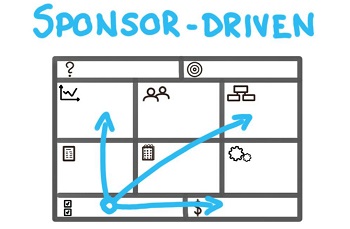
Often a government agency issues a research call on a specific topic and sets various requirements, like the budget, type of partnerships, and the maximum duration. In such a scenario, start to fill the Research Project Canvas from the Funder’s Requirements block, then advance to devise a Methodology that will allow you to reach the expected Results and make the agency happy.
Step 3: Rate your research project ideas
You will probably be able to generate more than one Research Project Canvas with an idea worthy of pursuing. With several such ideas in hand, you need to take a critical look at their potential and compare their chances of success. This is the time when you need to look in the mirror and honestly admit to yourself that there is no shortage of research project ideas in the science world and there are a vast number of open research questions that need to be answered.
You therefore need to focus on the best research ideas which have the greatest potential for impact. To judge and compare research project ideas at an early stage, use the Research Proposal Scorecard. This worksheet will help you to methodically rate each research idea. While you are filling the Scorecard, write down the main reasons for scoring the way you did so that you can recall your rationale later on.
As you rate your ideas, be brutally honest with yourself and discard any research ideas that do not hold enough potential. Time is a nonrenewable resource and it is simply not worth investing in writing research project applications that have little chance of being funded or delivering the results that you aim for.
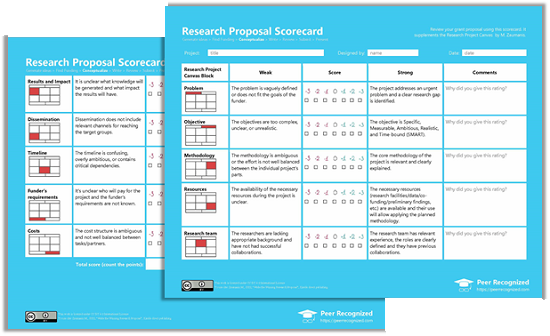
Once done with rating the research project ideas, staple the Scorecard together with the respective Research Project Canvas. If at some point the circumstances change, you will be able to come back to update the Project Canvas and modify your ratings.
Here are the questions included in the Research Proposal Scorecard:

Weak: The research project addresses an urgent problem and a clear research gap is identified.
Strong: The research problem is vaguely defined or does not fit the goals of the funder.

Objectives
Strong: The research objectives are Specific, Measurable, Ambitious, Realistic, and Time-bound (SMART).
Weak: The objectives are too complex, unclear, or unrealistic.

Methodology
Strong: The core methodology of the project is relevant and clearly explained.
Weak: The methodology is ambiguous or the effort is not well balanced between the individual project’s parts.

Resources
Strong: The necessary resources (research facilities/data/co-funding/preliminary findings, etc.) are available and their use will allow applying the planned methodology.
Weak: The availability of the necessary resources during the project is unclear.

Participants
Strong: The research team has relevant experience, the roles are clearly defined and the participants have previous collaborations.
Weak: The researchers are lacking appropriate background and have not had successful collaborations.

Results and Impact
Strong: The anticipated results are identified and pertinent to the defined knowledge gap. It is clear who benefits from the work and in what way.
Weak: It is unclear what knowledge will be generated and what impact the project results will have.

Dissemination
Strong: Dissemination activities are proportional to the ambition of the project and tailored to the relevant audiences.
Weak: Dissemination does not include relevant channels for reaching the target groups.

Timeline
Strong: The time spent on each activity is proportional to its complexity, the activities are well coordinated, and any boundary conditions are fulfilled.
Weak: The timeline is confusing, overly ambitious, or contains critical dependencies.

Budget
Strong: The project’s costs are clearly substantiated and proportional to the effort.
Weak: The project’s cost structure is ambiguous and not well balanced between tasks/partners.

Funder’s requirements
Strong: The likely research project funder is known, the planned budget is appropriate and the funder’s requirements can be fulfilled.
Weak: It’s unclear who will pay for the research project and the funder’s requirements are not known.
Research Project Idea Generation Toolkit
Below you can download the Research Idea Generation Toolkit, which includes everything I mentioned in this article: Research Idea Generation Worksheet, Research Project Canvas, and the Research Proposal Rating Scorecard.
Research Idea Generator
Generate research project ideas based on what you love doing, what is necessary, and what has the highest chance of success.
Writing the full research project proposal
After you have selected the winning research project idea, you will start to write the full research grant proposal. Use the filled Research Project Canvas as your guide in this process. It will help you to stay organized and make sure you remember to include everything that’s important in the proposal. Read about the ways the Project Canvas can help you here.
To further help you with kick-starting the grant writing process, I wrote an article that describes how using a key sentence skeleton can help you.
Once you have written the first draft of the project proposal, I suggest you use the Research Proposal Scorecard again. It will help you to re-evaluate you proposal and adjust any deficiencies as you go.
Conclusion
Coming with research grant ideas is objectively difficult. For me personally and many other scientists, it is difficult to come up with a single idea that we believe it worth pursuing.
Some other scientists have the opposite problem. They are constantly coming up with research ideas but they struggle with narrowing down to the one they really want to pursue.
In this article I equipped you with the tools that help with both of these problems. You can use the Research Idea Generation Worksheet to come up with grant proposal ideas. And you can then refine and rate them using the Research Project Canvas and the Research Proposal Scorecard.
Good luck with finding the right research project idea and carrying it through all the way to a running research project!
Author

Hey! My name is Martins Zaumanis and I am a materials scientist in Switzerland (Google Scholar). As the first person in my family with a PhD, I have first-hand experience of the challenges starting scientists face in academia. With this blog, I want to help young researchers succeed in academia. I call the blog “Peer Recognized”, because peer recognition is what lifts academic careers and pushes science forward.
Besides this blog, I have written the Peer Recognized book series and created the Peer Recognized Academy offering interactive online courses.

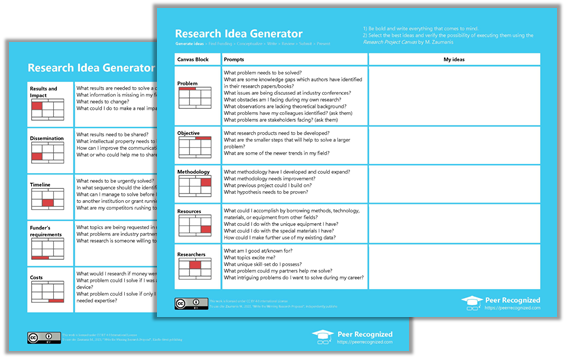
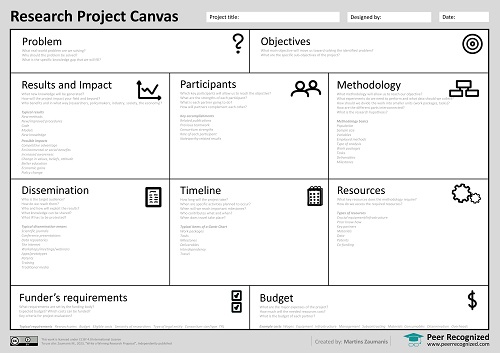
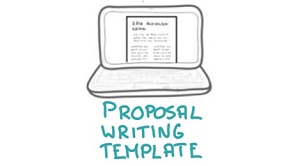
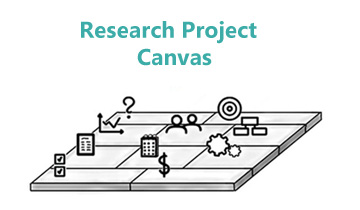
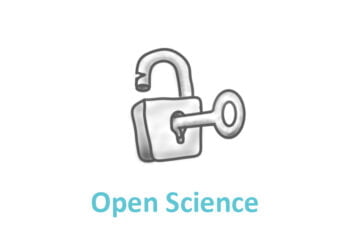


One comment